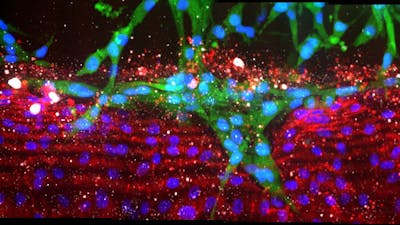Sangeeta Bhatia and Chris Chen, Wyss faculty members and friends since graduate school, are about to launch their second startup company
Wyss Associate Faculty members Chris Chen and Sangeeta Bhatia are long-time friends and colleagues. They met as graduate students in the Harvard–MIT Program in Health Sciences and Technology, got their M.D.s together at Harvard Medical School, and collaborated on projects once they started their own labs – Chen working on angiogenesis at the Johns Hopkins University and Bhatia working on liver cells at UC San Diego. Once their respective careers brought them back to Boston, their interactions grew exponentially, as they are both interested in bridging the gap between interesting science projects and innovations that help patients in the real world.
Being affiliated with the Wyss Institute provides a platform for us to work closely together, even though we’re appointed professors at different institutions.
Chen and Bhatia have been working on a set of technologies to build models of tissues and organs in cell culture in the lab. Similar to the Human Organ Chips created by the Wyss Institute’s Founding Director Don Ingber, their microfluidic systems mimic the physiology of functional units of organs. Given Chen’s focus on the vascular system and Bhatia’s focus on the liver, their cells are grown in a channel vessel structure instead of the laminate layer found in Ingber’s chips. In the process of modeling vasculature within these devices, they started studying the physiology of the blood vessels themselves, including permeability, clotting, and immune cell infiltration.

This research led Chen and Bhatia to co-found Satellite Bio in 2022, a startup that selectively programs cells and then assembles them into tissue structures that can be implanted into patients to repair, restore, or even replace dysfunctional or diseased tissues or organs. The company is initially focusing on ushering in a new realm of treatment for liver diseases with its hepatocyte Satellite tissues (HepSAT) that enable hepatocyte engraftment, function and vascularization, leading to long-term repair and restoration of liver function.
The fact that they could build miniature models of functional blood vessels led them to wonder if they could also model lymphatic vessels in their chips to study how these vessels take up fluid from surrounding tissues. Bhatia is especially interested in using nanoparticles for cancer drug delivery, and understanding how materials drain out of a tissue is important for establishing how nanoparticle encapsulation affects the movement of drugs through the body. More recently, they started modeling and studying lymph tissue together, and are now using what they’ve learned to further develop a new therapeutic that they think could be used to treat lymphedema, or chronic swelling caused by a buildup of lymphatic fluid. There is currently no cure for this condition, which occurs in numerous post-surgical settings and in some rare genetic disorders.
The Wyss Institute’s translational infrastructure allowed us to seamlessly transition from asking fundamental science questions about how these tissues worked to working on developing therapeutic interventions that could actually be transformational for these patients who currently have no options. That kind of pivot would not have been possible if we had needed to rely on academic grants for funding.
Bhatia and Chen’s project was named an Institute Project in July 2021, and they are actively working to commercialize their new therapeutic with another startup in 2023. The success of their therapeutics venture will validate their lymph model, which they then plan to use as an engine to keep developing more applications in the lymphatic drug development space.

